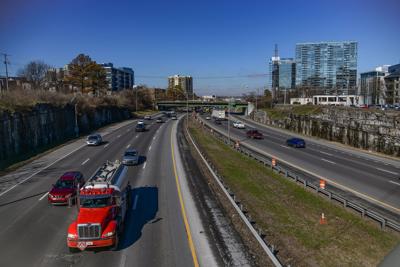Members of the Tennessee General Assembly on both sides of the aisle are in rare agreement on an issue: The state’s infrastructure is in dire need of an overhaul. The sentiment may be bipartisan, but with Tennessee’s estimated needs list tallying roughly $63 billion, solutions and funding strategies are rocky terrain.
Transportation infrastructure makes up the biggest chunk of this number, with estimates ranging from $26 billion to upwards of $30 billion, and going into his second term, Gov. Bill Lee made it clear that this would be a priority. While we haven’t yet seen any related legislation, Lee’s proposed Transportation Modernization Act is already creating a stir. Based on press releases and a presentation in early January, the biggest focus of Lee’s plan is adding lanes to existing highways through public-private partnerships. In Nashville, this would mean “choice lanes” where drivers could pay a fee in order to theoretically avoid congestion.
In recent years, multimodal options such as bike lanes and bus lines have become increasingly popular in Nashville. But not only does this plan seem not to acknowledge multimodal options, state Sen. Heidi Campbell (D-Nashville) says it could prove to be a setback in the city’s movement away from cars.
“Chronically, we have made decisions that have not benefited Nashville’s environments and our health and our well-being, and this is an opportunity for us to change that,” says Campbell. “And once again, we find that we’re being influenced by the state to have to miss opportunities in Nashville for healthier multimodal options.”
Campbell also has mixed feelings about going the public-private partnership route, a funding structure that can speed up delivery times but brings an element of murkiness when it comes to where the financial burdens fall. Lee is pursuing that strategy in an effort to avoid increasing the gas tax or taking on new state debt.
“Our state — very recently, especially — has a history of being irresponsible when it comes to privatized public works in general,” Campbell tells the Scene. “What I don’t want to see is the state profiting from Nashville workers who are paying to use those lanes. I want that money to get back to Nashville.”
Despite the focus on roads, Tennessee legislators on both sides of the aisle are also in the early stages of trying to increase Amtrak’s presence in the state, with TDOT last year showing interest in using passenger rail to link Tennessee’s major cities. Federal funding applications for the project are due March 20.
This year, the Republican supermajority plans to focus on infrastructure, punishing Metro Nashville and culture-war issues






